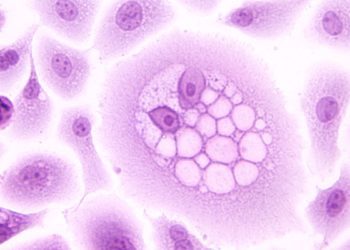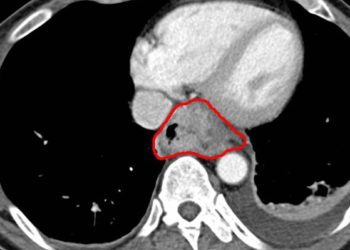Medical masks do not demonstrate definitive noninferiority to N95 respirators in preventing COVID-19
1. This randomized controlled trial did not definitively demonstrate noninferiority between N95 respirators and medical masks in preventing coronavirus disease 2019 (COVID-19) in unvaccinated healthcare workers.
2. No serious adverse events, such as intensive care unit admission or death, were recorded in either group.
Evidence Rating Level: 2 (Good)
Study Rundown: The current evidence is mixed regarding the effectiveness of medical masks versus N95 respirators for protecting against COVID-19. The present study compared rates of infection in healthcare workers treating COVID-19 patients wearing N95 respirators versus medical masks. More individuals had reverse transcriptase polymerase chain reaction (RT-PCR) confirmed COVID-19 in the medical mask group compared to the N95 respiratory group overall. In subgroup analyses of individual countries, Canada, Israel, and Pakistan all had higher rates of PCR-confirmed COVID-19 in the medical mask group than the N95 group. However, Egypt had a higher rate of COVID-19 in the N95 group than in the medical mask group. There were no intensive care admissions and no deaths in either group. Exposure to patients with confirmed or suspected COVID-19, length of exposure, and community exposure were similar between the two groups. Adherence to assigned medical masks was based on self-report, with a large majority of participants reporting as “always” in both groups. Adherence to other forms of personal protective equipment such as hand hygiene, eye protection, gowns, and gloves was similar between the study groups. Due to the widespread adoption of vaccinations and high rates of seropositive individuals, the generalizability of these results to the current population is limited as the study excluded vaccinated and previously infected individuals.
Click to read the study in AIM
Relevant Reading: Effectiveness of adding a mask recommendation to other public health measures to prevent SARS-CoV-2 infection in Danish mask wearers
In-Depth [randomized controlled trial]: In this multicenter, international, randomized controlled trial, healthcare workers were randomly assigned to medical masks or N95 respirators when providing care to patients with suspected or confirmed COVID-19. Individuals who had laboratory-confirmed COVID-19 or received a COVID-19 vaccine with greater than 50% efficacy against the circulating strain were excluded. Individuals from 29 healthcare facilities in Canada, Israel, Egypt, and Pakistan were enrolled. A total of 500 participants were assigned to medical masks and 509 to N95 respirators. Seropositivity at baseline varied across countries with Canada at 2% and Egypt at 81%. However, overall 37.5% of participants in the medical mask group and 37.2% in the N95 respiratory group were seronegative at baseline. For the primary outcome, 10.46% in the medical mask group versus 9.27% in the N95 respirator group had RT-PCR-confirmed COVID-19 at the end of the follow-up period (Hazard Ratio [HR] 1.14; 95% Confidence Interval [CI], 0.77 to 1.69). Post hoc intention-to-treat subgroup analysis demonstrated that in participants with no reported household or community exposure to respiratory illness (HR 1.06, 95% CI 0.53 to 2.11) versus one or more reported household or community exposure to respiratory illness (HR 1.08, 95% CI, 0.66 to 1.78) there was no change in treatment effect (p=0.96). Adherence to the assigned group was based on self-report, and 91.2% of participants in the medical mask group reported “always” wearing masks compared to 80.7% in the N95 respirator group. Overall, this study does not demonstrate definitive noninferiority between N95 respirators and medical masks in unvaccinated healthcare workers.
Image: PD
©2022 2 Minute Medicine, Inc. All rights reserved. No works may be reproduced without expressed written consent from 2 Minute Medicine, Inc. Inquire about licensing here. No article should be construed as medical advice and is not intended as such by the authors or by 2 Minute Medicine, Inc.







